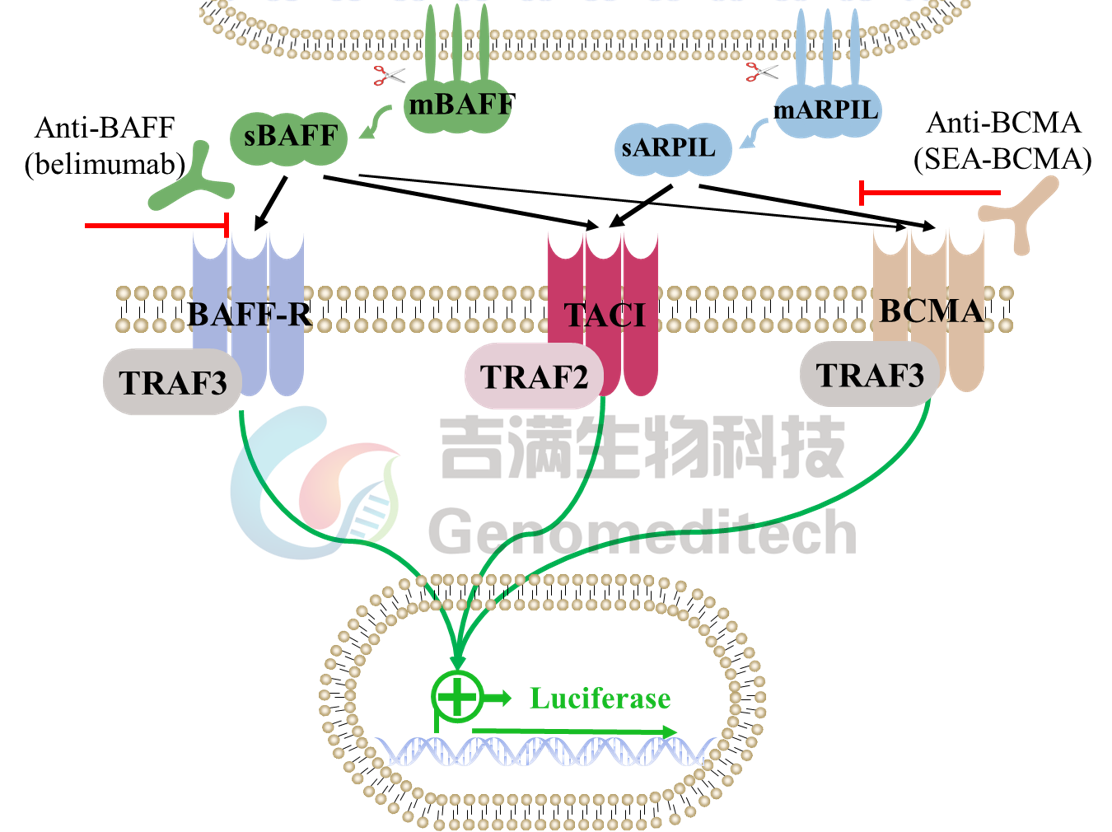BCMA (B-cell Maturation Antigen), BAFFR (B-cell Activating Factor Receptor), and TACI (Transmembrane Activator and Calcium Modulator and Cyclophilin Ligand Interactor) are proteins belonging to the tumor necrosis factor receptor superfamily (TNFRSF). They play critical roles in the development, survival, and function of B cells. Through interactions with their ligands, these three receptors collaboratively regulate B cell survival, proliferation, and function, which are essential for the proper functioning of the immune system.
BCMA (B-cell Maturation Antigen):
BCMA is a transmembrane protein highly expressed in mature B cells and plasma cells. By binding to its ligands APRIL and BAFF, BCMA promotes plasma cell survival and antibody secretion. Due to its high expression in plasma cell malignancies such as multiple myeloma, BCMA has become an important target for immunotherapy. For example, BCMA-targeted CAR-T cell therapy and antibody-drug conjugates (ADC) have shown remarkable efficacy in the treatment of multiple myeloma. Additionally, BCMA expression levels are closely associated with plasma cell activity and have been used to assess disease progression and therapeutic response.
BAFFR (B-cell Activating Factor Receptor):
BAFFR is the primary receptor for BAFF and is predominantly expressed in B cells. It plays a central role in B cell maturation and survival, particularly in the transition of transitional B cells to mature B cells. BAFFR signaling regulates B cell survival and proliferation through both the classical and non-classical NF-κB pathways. Dysregulated BAFFR signaling is closely associated with various autoimmune diseases, such as systemic lupus erythematosus (SLE) and rheumatoid arthritis (RA), making it an important target for studying the pathogenesis and treatment of autoimmune diseases.
TACI (Transmembrane Activator and CAML Interactor):
TACI is expressed in B cells and certain T cell subsets. It binds to both BAFF and APRIL, regulating B cell proliferation, differentiation, and antibody production. TACI plays a critical role in maintaining immune tolerance and modulating immune responses. Dysfunction of TACI is associated with immunodeficiency (e.g., common variable immunodeficiency, CVID) and autoimmune diseases (e.g., systemic lupus erythematosus). TACI signaling can both promote antibody production and suppress excessive B cell activation through negative regulatory mechanisms, thereby playing a dual role in maintaining immune balance.
BCMA, BAFFR, and TACI are indispensable for the development, survival, and functional regulation of B cells and are closely associated with various diseases, including malignancies, autoimmune diseases, and immunodeficiencies. They are not only important targets for studying B cell biology but also provide new directions and strategies for cancer immunotherapy and autoimmune disease treatment.
Genomeditech provides functional cell lines, overexpression cell lines, proteins, and antibodies related to BCMA, BAFFR, and TACI targets, supporting the activity validation of drugs targeting these molecules. These tools will help researchers better evaluate and optimize the development of BCMA-, BAFFR-, and TACI-related drugs, advancing their application in immunotherapy.















